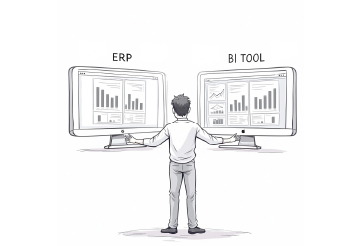Unlocking the Power of Data: Integrating BI Tools with Existing ERP Systems
Today, everything revolves around Data. Every business has to rely on a lot of data to make important decisions for their growth.
Your ERP systems can help you in managing your data like finance, sales, inventory and many such things, but it cannot make a decision that is suitable for the growth of your business.
Analyzing these data manually can be tiring and can almost go wrong in worst case scenario, which is why it is necessary to integrate your ERP with a suitable Business Intelligence tool.
Business intelligence tools will help you analyze data in your ERP and provide valuable insights that can help you grow your business.
Why Integrate BI with ERP?
While ERP is good at storing data, it cannot help you make quick decisions or show you rising trends. However, integrating BI tools with ERP can help you:
- Spot problems or opportunities
- Predict future trends
- Give real-time inventory updates
- Analyse and make data-driven decisions
Together they will make a powerful team that will help your business in the long run
How to integrate BI tool with ERP?
Choose the appropriate BI tool for your ERP:
Connect your ERP and BI tool:
Data setup:
Create reports and insights:
- View the bigger picture - Spot patterns and trends easily with combined ERP and BI data.
- Smarter decisions - Make quick and smart choices using real-time data
- Plan ahead – Predict the future trends and plan accordingly
- Track what you want – View and track the data the way you want it to be
- Stay updated - Always work with the latest, accurate data.
Start by selecting a BI tool that works well with your current ERP system. Make sure it can easily access and understand the data stored in your ERP. Choose @SNC’s BI tools to have hassle-free ERP integration.
Use the available options in both ERP and BI tools to easily enable the integration process. Enabling this will allow the BI tool to extract data from ERP through connectors or APIs.
Decide what data you want to use—like sales, expenses, or inventory. Make sure the data is clean, organized, and updated regularly so the reports are accurate. Once the data is set up, choose how often it should get updated into the BI tool like daily, weekly, or monthly.
Now you can use the BI tools to help analyze data using smart analyzing techniques and get results in the form of easy-to-understand dashboards, reports, and visuals. These will help you see trends, track performance, and make better decisions based on real data.

Benefits of this integration:
Conclusion:
Integrating your ERP system into the BI tool can be a clever strategic move to build your business.
@SNC our BI tools can be customized for your ERP system and can integrate with it in a seamless manner.
Join us now to make better decisions tomorrow.
